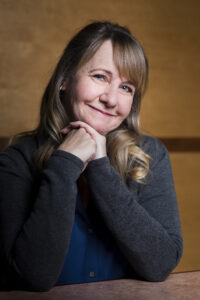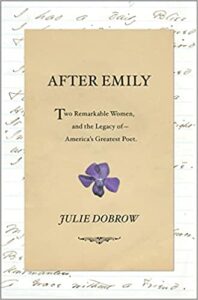By David Wilkening, Contributing Writer

Media tend to stereotype as a kind of shortcut, says Julie Dobrow, a senior lecturer at Tufts University in Medford.
Photo/Alonso Nichols, Tufts University
MEDFORD – Julie Dobrow, one of New England’s best-known media experts, has done considerable research on how media impacts children. But media stereotypes and other misconceptions for younger audiences also apply to the elderly. And while she is not yet a grandmother, she has some suggestions for achieving media literacy, grandparent-style.
“Some of the same principles apply to older people. The stereotype picture is of ‘doddering’ old folks. They’re often not seen at all or depicted as irrelevant or in a limited number of occupational roles,” said Dobrow.
Media portrayals matter, of course, because they impact what people think and believe about all groups―young and old. Dobrow’s educational philosophy as a college teacher and writer is “media literacy” or to educate others to be more careful and critical of media portrayals. That means “not to believe everything we see or do but to ask critical questions about it…such as who is producing it and what were they thinking?” according to Dobrow.
Background includes various media connections
Dobrow, 61, is a senior lecturer at Tufts University in Medford, and is director of the Center for Interdisciplinary Studies there. She is also Tisch College Senior Fellow for Media and Civic Engagement. She has various other academic positions involving children and media but is better known to the general public though her writing, which has appeared in the Huffington Post, Boston Globe Magazine and others. She is also a biographer.
Dobrow was born in New York City and raised on Long Island, where she was well-acquainted with the world’s largest media market. She can’t recall any particular influence from that environment, but always thought she would be a writer.
Her later professional training began at Smith College, where she studied anthropology, sociology, and women’s history. She received her M.A. and Ph.D. from the Annenberg School of Communication at the University of Pennsylvania, with a focus on the sociological implications of technology in mass communication.
Much of her research today focuses on the content and effects of media on children. She is a co-founder of the Tufts Children’s Television Project (CTV).
For children, as well as for older adults, perhaps the most common media misrepresentation involves stereotypes.
“What we’ve found in our research is that media tend to stereotype as a kind of shortcut. When you don’t have a lot of time to develop character, you rely on stereotype to help tell a part of a story. This is as true in the depiction of older people as it in the case of gender, ethnic or racial representation,” she said.
As for her advice to seniors coping with grandchildren, there are some suggestions from a Tufts study that found half of American households had children who were eating two or more meals every day in front of the television.
Dobrow, who has four grown children and is the coordinator of Family and Media Initiative at Tufts, said she has made it the household rule to not eat family meals in front of the television.
Ways for grandparents to help foster media literacy

Photo/submitted
“It’s not that I’m terribly opposed to it. It’s just that we want mealtime to be family time. In our house, we try to make it television watching with active engagement,” she said.
Older relatives might start with an initial awareness that children place an importance and pay attention to media―which underscores the importance of media literacy―and some skepticism. If you don’t understand why your child or grandchild is playing video games, ask why they’re interesting. If you don’t get why a child is spending so much time on a phone, ask about what apps they’re using, Dobrow advised.
“My own personal philosophy is that rather than squander the energy and attention most kids invest in media, channel it―hence the focus on media literacy,” she said.
“Research has consistently found that it is not the time spent on media that is a determinant of what kids do or don’t get out of it, it’s the content, itself. And another piece of advice would be to ask kids what it is that they’re doing, or what it is that like and why? They are the digital natives, after all!”
Well-received Dickinson book
Dobrow is the author of “After Emily: Two Remarkable Women and the Legacy of America’s Greatest Poet.” It tells the story of a mother and daughter whose tireless work to edit and publish Emily Dickinson’s then-obscure poems led to her hallowed place in American literature.
During research for her Dickinson book, she was a frequent visitor to the poet’s bedroom in Amherst, which is now a museum. It is where Dickinson spent her entire life.
 Her Dickinson book, published by W.W. Norton, was described in the Irish Times as “Beautifully produced…with the quality of both biography and of a thrilling soap-opera.” The New Yorker magazine called it a “riveting account of the mother and daughter who brought Emily Dickinson’s genius to life.” It was also a finalist for the New England Society Book Award in 2019. It received that year’s “Conch Shell Award” from the Amherst Historical Society.
Her Dickinson book, published by W.W. Norton, was described in the Irish Times as “Beautifully produced…with the quality of both biography and of a thrilling soap-opera.” The New Yorker magazine called it a “riveting account of the mother and daughter who brought Emily Dickinson’s genius to life.” It was also a finalist for the New England Society Book Award in 2019. It received that year’s “Conch Shell Award” from the Amherst Historical Society.
Outside of her work at Tufts, Dobrow has volunteered extensively on town boards and committees in her community of Lincoln in educational and environmental realms. She is also president of the Boston Authors Club. Dobrow describes herself as a “big news junkie.” Her taste in television viewing is historical dramas and PBS documentaries.
“I always tell my classes that when my kids were younger, I had my little home laboratory of four kids at different development levels,” she said.
RELATED CONTENT:
Bruce Frankel – Best-selling author spreads message of anti-ageism (fiftyplusadvocate.com)
Massachusetts is reimagining aging in its communities (fiftyplusadvocate.com)
Seniors embrace company’s virtual reality experience (fiftyplusadvocate.com)












